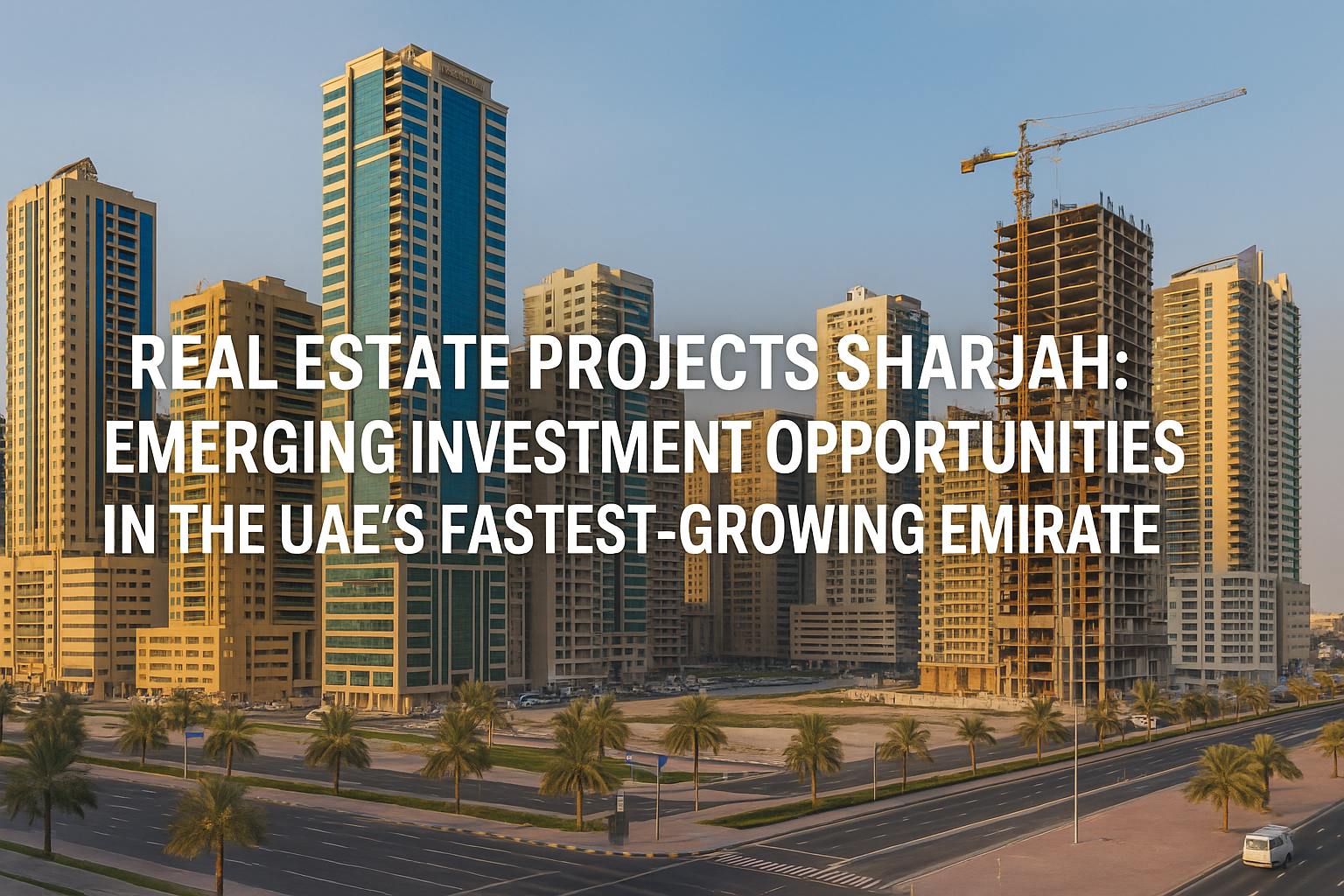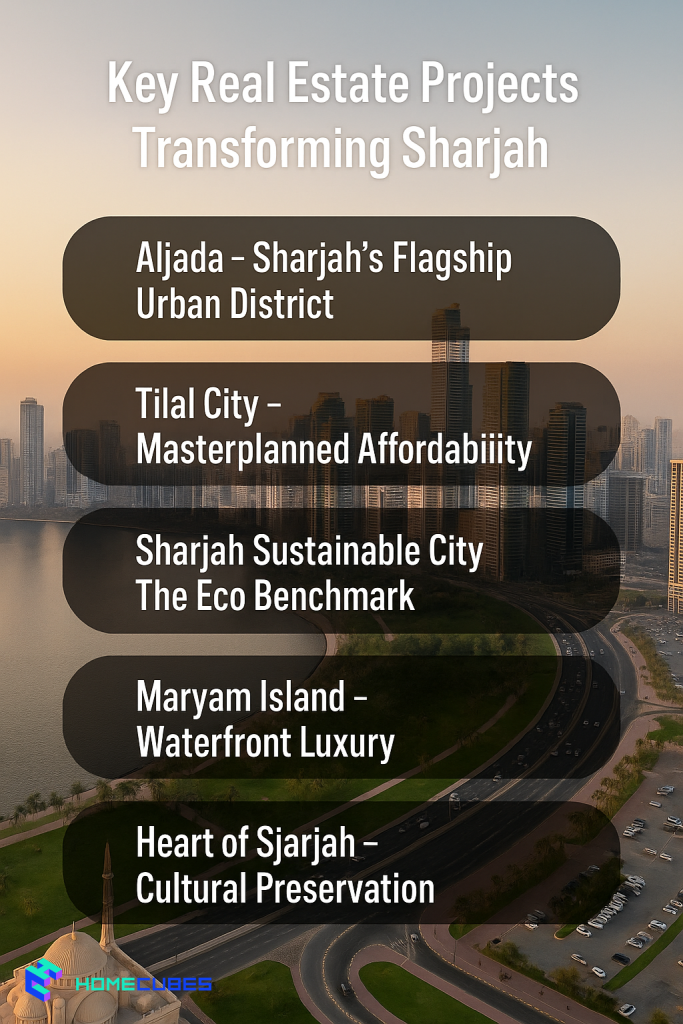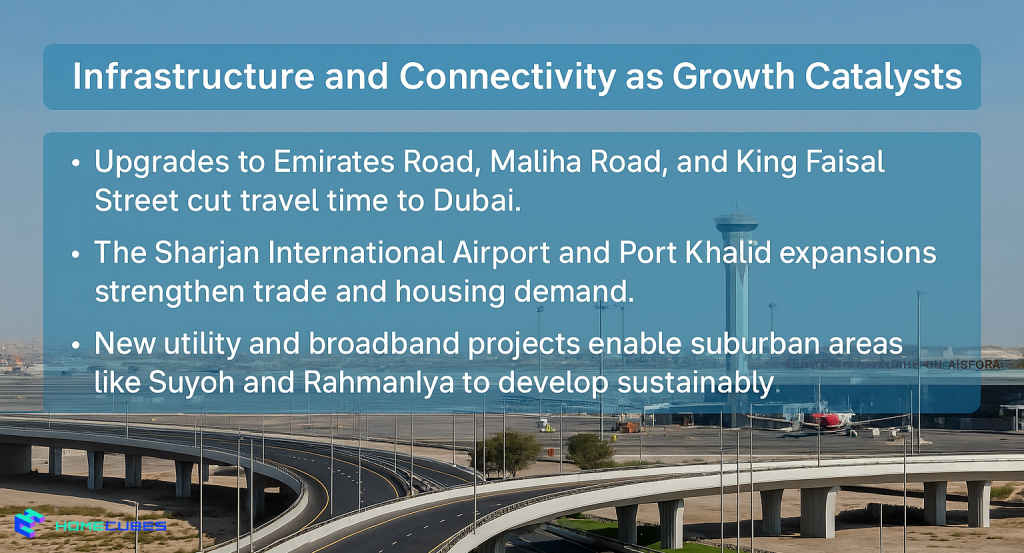

Table of Contents
- Introduction
- Sharjah’s Real Estate Momentum and 2025 Outlook
- Key Real Estate Projects Transforming Sharjah
- Residential and Commercial Investment Trends
- Who Is Investing in Sharjah?
- Infrastructure and Connectivity as Growth Catalysts
- Sustainability and Smart Developments
- Government Support and Property Regulations
- Case Study: Aljada by Arada
- Fees and Charges for Property Buyers in Sharjah
- Mistakes to Avoid When Investing in Sharjah
- Risks and Market Challenges
- Market Outlook 2025–2026: Sharjah vs Dubai
- Frequently Asked Questions (FAQ)
- Final Thoughts
- Homecubes Support and Invitation
Introduction
Sharjah is rapidly transforming into one of the UAE’s most promising real-estate frontiers. Once overshadowed by Dubai and Abu Dhabi, the emirate now attracts regional and international investors seeking affordability with long-term upside.
Strategically positioned between Dubai and the Northern Emirates, Sharjah balances accessibility, culture, and infrastructure growth. For investors priced out of Dubai’s prime zones, real estate projects Sharjah represent a gateway into the UAE’s next property cycle.
This guide dissects Sharjah’s momentum — its key developments, ROI trends, costs, risks, and investor landscape — to help you make informed, data-driven decisions.
Sharjah’s Real Estate Momentum and 2025 Outlook
Sharjah recorded #realestate transactions totalling more than $1bn in January. For context, around $540m worth of sales took place in January 2023.
It will be interesting to see whether the Emirate can maintain this brisk pace throughout 2024.https://t.co/Kh5eDfWzo8 pic.twitter.com/r56Vu0LK1r
— Amira Sajwani | أميرة سجواني (@Amira_H_Sajwani) March 14, 2024
UAE real estate boom has helped Sharjah’s property sector to thrive. According to Khaleej Times, transaction values hit AED 7 billion in January 2025, soaring nearly 80 percent year-on-year (Khaleej Times).
By mid-2025, real-estate transactions climbed 48 percent YoY to more than AED 27 billion across 48,000 deals, cementing Sharjah’s rank among the UAE’s fastest-growing property markets (Arabian Business).
Rental and sale prices are trending higher: Bayut reports apartment values up to 24 percent and villa prices up 16 percent in 2023 (Bayut).
Meanwhile, Sharjah attracted USD 1.5 billion in foreign investment in 2024–2025 through 74 new projects spanning property, industry, and infrastructure (Gulf News).
Together these figures confirm that real estate projects Sharjah are no longer secondary; they’re a primary driver of UAE urban diversification.
Key Real Estate Projects Transforming Sharjah

Aljada – Sharjah’s Flagship Urban District
Developed by Arada, Aljada spans 24 million sq ft in Muwaileh. It fuses residential, retail, education, and leisure into a self-contained city. Over 7,500 units are complete with further phases due in 2025. Its AED 15 billion backlog signals strong end-user absorption and developer credibility.
Tilal City – Masterplanned Affordability
A joint venture between Tilal Properties and the Sharjah Government, Tilal City merges residential, commercial, and retail zones along Emirates Road. It targets middle-income buyers through serviced plots and cost-efficient layouts.
Sharjah Sustainable City – The Eco Benchmark
Co-developed by Shurooq and Diamond Developers, this 7.2-million-sq-ft project features solar rooftops, wastewater recycling, and EV infrastructure. Households enjoy up to 50 percent utility savings — setting the green standard for real estate projects Sharjah.
Maryam Island – Waterfront Luxury
Eagle Hills’ Maryam Island brings resort-style living via promenades, hotels, and waterfront apartments overlooking Al Khan Lagoon — Sharjah’s answer to beachfront urbanism.
Heart of Sharjah – Cultural Preservation
Shurooq’s Heart of Sharjah restores heritage districts into a vibrant hub of boutique hotels, souqs, and museums — merging history with hospitality returns.
Residential and Commercial Investment Trends
Residential property dominates Sharjah’s growth narrative due to affordability and commuter proximity to Dubai. Al Majaz, Al Nahda, and Al Khan remain popular with renters, while master communities like Aljada and Masaar draw families seeking gated comfort.
Commercial assets benefit from the SAIF Zone and airport expansion, spurring warehouse, office, and light-industrial demand. Retail and hospitality elements in mixed-use zones add investment diversity.
Who Is Investing in Sharjah?
- UAE and GCC nationals form the market foundation.
- South Asian and European investors enter for value and yield.
- Young professionals and families use Sharjah’s cost advantage to own rather than rent.
Nearly half of buyers are now investors rather than end users, reflecting confidence in Sharjah’s yield profile (Sands of Wealth).
Infrastructure and Connectivity as Growth Catalysts

- Upgrades to Emirates Road, Maliha Road, and King Faisal Street cut travel time to Dubai.
- The Sharjah International Airport and Port Khalid expansions strengthen trade and housing demand.
- New utility and broadband projects enable suburban areas like Suyoh and Rahmaniya to develop sustainably.
These improvements enhance capital appreciation potential across real estate projects Sharjah.
Sustainability and Smart Developments
Sharjah’s development model is pivoting toward sustainability:
- Sharjah Sustainable City integrates solar, EV mobility, and circular-waste systems.
- Masaar by Arada offers “green spine” landscaping and smart-home features.
- Building codes are tightening to mandate energy efficiency and waste recycling.
Sustainable design now translates directly into long-term valuation and tenant retention.
Government Support and Property Regulations
The Sharjah Real Estate Registration Department enforces escrow protection and digital title verification.
Freehold ownership for all nationalities is permitted in selected zones, broadening foreign access. Alignment with federal visa and residency rules is expected through 2026.
Such policies continue to reinforce Sharjah’s credibility as a transparent real-estate jurisdiction.
Case Study: Aljada by Arada
Overview: Launched in 2018 as Sharjah’s largest mixed-use district.
Deliveries: 7,500 + units completed by 2025.
Pricing: AED 700 → 950 per sq ft (2018–2025).
ROI: ≈ 8–9 % CAGR; rental yield ≈ 6–7 %.
Key Takeaway: Aljada demonstrates Sharjah’s capacity to absorb mega-projects while delivering steady value growth and community integration.
Fees and Charges for Property Buyers in Sharjah
| Fee Type | Typical Rate | Notes |
| Title Registration | 2–4 % of value | Payable to RERD on transfer |
| Agency Commission | ≈ 2 % | Negotiable |
| Developer Registration Fee | ≈ 1 % | Varies by developer |
| Service / Maintenance | AED 3–7 / sq ft / yr | Depends on amenities |
| Mortgage Processing | Variable | Bank-specific charges |
| VAT (Commercial only) | 5 % | Residential resales exempt |
Mistakes to Avoid When Investing in Sharjah
- Skipping developer due diligence.
- Underestimating service fees.
- Over-speculating on off-plan flips.
- Ignoring resale liquidity.
- Concentrating too heavily in one district.
Disciplined portfolio planning ensures steady returns from Sharjah’s value market.
Risks and Market Challenges
- Construction delays or overruns.
- Mid-tier oversupply risk.
- Rising interest rates affecting financing.
- Global macroeconomic shocks.
- Gradual policy alignment with federal frameworks.
Selecting projects with strong escrow and delivery records mitigates these risks.
Market Outlook 2025–2026: Sharjah vs Dubai
Dubai dominates luxury segments, while Sharjah offers growth from a lower base.
Analysts expect Sharjah’s mid-market communities to outperform as migration from Dubai continues.
Enhanced connectivity positions Sharjah as the UAE’s affordable yet sustainable investment alternative.
Frequently Asked Questions (FAQ)
Is property ownership open to foreigners in Sharjah?
Yes — foreigners can buy in designated freehold zones such as Aljada, Tilal City, and Sharjah Sustainable City. Confirm whether the title is freehold, leasehold, or usufruct to match your investment plan.
What ROI can buyers expect from real estate projects Sharjah?
Average rental yields range 5–8 %, with capital growth 6–10 % in well-located projects. Villas in Tilal City and apartments in Aljada show strong occupancy thanks to family demand and Dubai connectivity.
Are off-plan properties safe investments?
Yes, if registered with RERD and funded through escrow accounts. Choose developers like Arada or Shurooq with proven delivery records to minimize risk.
How long does registration take?
Usually 3–5 working days after document submission. Financed purchases may take slightly longer for bank clearance.
Can non-UAE residents get mortgages?
Yes. Banks offer loans with ~25 % down payment and verified income. Rates are competitive with Dubai; eligibility depends on nationality and property type.
Which areas offer best long-term value?
Aljada (for integrated living), Tilal City (for plots and mid-income families), and Sharjah Sustainable City (for eco-investors). Maryam Island suits short-term rental strategies.
Will Sharjah introduce investor visas?
Authorities plan alignment with the UAE Golden Visa scheme. Thresholds (~AED 2 million) could enable multi-year residency for property owners.
What drives rental demand in Sharjah?
Affordability, family-oriented communities, and proximity to Dubai jobs. Education and healthcare growth sustain tenant demand in mid-range segments.
Sharjah or Dubai — which is better for 2025 investment?
Dubai offers liquidity and prestige; Sharjah delivers higher yield stability and affordable entry. Balanced portfolios should include both.
Final Thoughts
Sharjah has evolved from a supportive housing market into a fully independent investment hub with its own growth logic, identity, and ecosystem. The emirate’s combination of affordable entry points, environmentally driven master plans, and regulatory transparency positions it among the most promising real estate markets in the GCC.
While Dubai continues to command global investor attention, Sharjah is quietly delivering steady, sustainable appreciation backed by strong infrastructure, cultural value, and family-focused developments. Investors seeking yield stability, tangible community living, and long-term capital protection find Sharjah’s projects a balanced counterweight to Dubai’s higher volatility.
The next phase of Sharjah’s evolution will be driven by integrated smart communities, public–private partnerships, and expanded freehold zones for foreign buyers. Those who enter now stand to benefit not only from attractive pricing but also from early positioning in a city on the verge of global recognition.
Homecubes Support and Invitation
At Homecubes, our mission is to simplify fractional and tokenized real-estate investment across the UAE.
We’ve applied for our VARA license, and our services will launch upon approval.
We’ll help investors compare projects in Sharjah and Dubai through transparent, data-driven analytics.
👉 Contact our team to receive launch updates and early access invites.
Your path to regulated, fractional real-estate ownership in the UAE begins with Homecubes.










